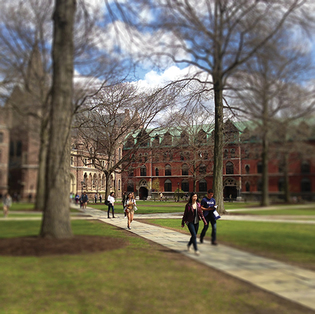
Michael Marsland
The Old Campus, which usually houses mostly first-year students, will have a mix of students in the fall as the college tries to accommodate an unusually large first-year class.
View full image
The Yale campus is perking up. After a year of lockdowns, remote learning, and deserted public spaces, cautious optimism rules. Same as it ever was? Not exactly. But come September, Yale students are expected to be back in their classrooms, their labs, and their libraries—though still subject to evolving public health guidelines.
“We want it to be as close to how things were before the pandemic as it can be, though there will be differences over August and September just because it is a transition from this year,” says Yale College dean Marvin Chun, “but the goal is to ramp up to how things were before the pandemic as quickly and as safely as possible.”
Residential colleges will be at full capacity, all classes are expected to be in person, and the full range of extracurricular activities should be available to students, assuming the public health guidelines don’t dictate otherwise.
In late spring, Chun announced a staggered move-in schedule for Yale College students, starting with pre-orientation days for first-years that will kick off on August 23. Most students in upper classes will move in last, just two days before the start of classes, meaning that the weeklong period when students are on campus but not in class (known as “Camp Yale”) will be curtailed—unfortunate, but necessary, says Chun.
Among the restrictions likely to stay in place: all Yale students will be required to be vaccinated before moving in or attending classes. Students who haven’t been vaccinated (with university-approved vaccines) will be expected to arrive early, get their vaccines at Yale, quarantine, and follow any other public health guidelines.
There will also be short-term adjustments. The Yale College Class of ’25 will be unusually large, because of the 335 students admitted to the Class of ’24 who took a pandemic gap year. Directed Studies, for example, will include eight sections this fall, rather than the usual seven. And housing will be shuffled around. First-years from only six residential colleges will live on Old Campus, instead of the usual ten; the rest will live in their colleges. Sophomores from four colleges will live on Old Campus.
Yale College is also introducing a new housing option this fall: mixed-college housing in McClellan Hall on the Old Campus, for juniors and seniors who want to stay on campus but live with friends from different residential colleges. “They don’t necessarily want to leave their college affiliations, their dean, their head, while living with the people they want to live with,” says Chun.
Course selection in Yale College will also change: returning students must begin registering for classes near the end of the prior semester. (The preliminary registration for the fall term was June 4.) But contrary to reports that Yale had discontinued its traditional “shopping period”—when students sample classes before submitting their final schedule—the students will still be able to add and drop courses in the early days of a semester. They’ll have seven days to do it, slightly fewer than the eight to ten days of years past. “The idea behind early registration is to give you a head start with that exploration, not to curtail it, and to reduce stress, not to add to it,” wrote Chun in his statement to the Yale community. “Shopping period isn’t going anywhere.”
While all classes will take place in person again, Professor Pericles Lewis, vice provost for academic initiatives, says the level of online teaching has gone up in some schools of the university. And Yale has moved up the timetable on a new, mostly online master of public health degree, geared toward 30-something working professionals with limited flexibility.
Even so, Lewis says there is nothing like in-person teaching, and he’ll be “delighted” to see students back in the classrooms. “People managed to learn a lot in an unusual circumstance,” he says, “but we also realized how much we missed the ability to have casual conversations. The learning happens almost by osmosis.”
 loading
loading